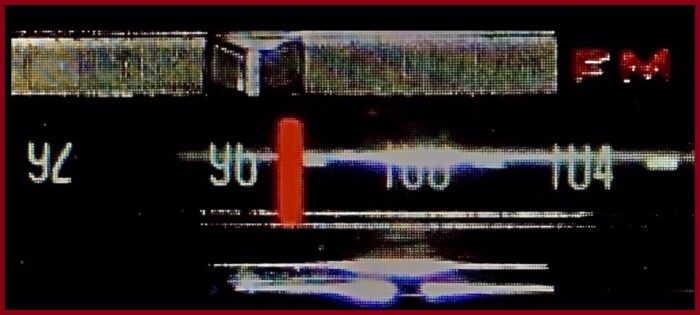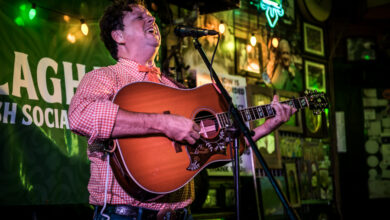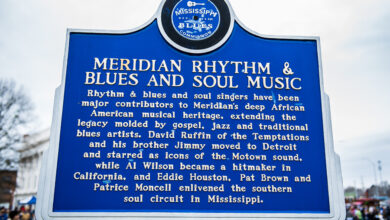Mississippi Blues Trail Series – Peavey Electronics

By Brenda Germany
Photos by Stephen Anderson
Additional Editing by Johnny Cole
“Peavey is the sound of the Mississippi juke joint. That’s our sound and we take it around the world.”
– Luther Dickinson of the North Mississippi Allstars
Meridian, MS, the state’s sixth-largest city and the county seat of Lauderdale County, lies approximately 100 miles due east of the state capital, Jackson, and is home to three Mississippi Blues Trail Markers: Jimmie Rodgers & the Blues, Meridian Rhythm & Blues and Soul Music and Peavey Electronics. In this article our destination is the Peavey Electronics marker located at 5022 Hartley Peavey Drive near their sprawling manufacturing facility that spans a quarter of a mile.
Meridian’s history begins in 1831, a year after the Mississippi Choctaw Indians agreed to give up their territories in accordance with the Treaty of Dancing Rabbit Creek. In October 1855, Meridian’s economic future was assured when the first Mobile and Ohio Railroad train stopped at the McLemore plantation and established Sowashee Station. Railroads also brought touring musicians to town and those traveling to or from the clubs of New Orleans. The “Queen City” emerged as a music hotspot, an attribute it still retains. Among the most famous and gifted Meridian citizens are Jimmie Rodgers, known as the Father of Country Music and Hartley Peavey, who in 1965, founded Peavey Electronics, which has greatly influenced the sound of modern electric blues, rock, country, and jazz through its production of amplifiers, sound systems, electric guitars and basses.
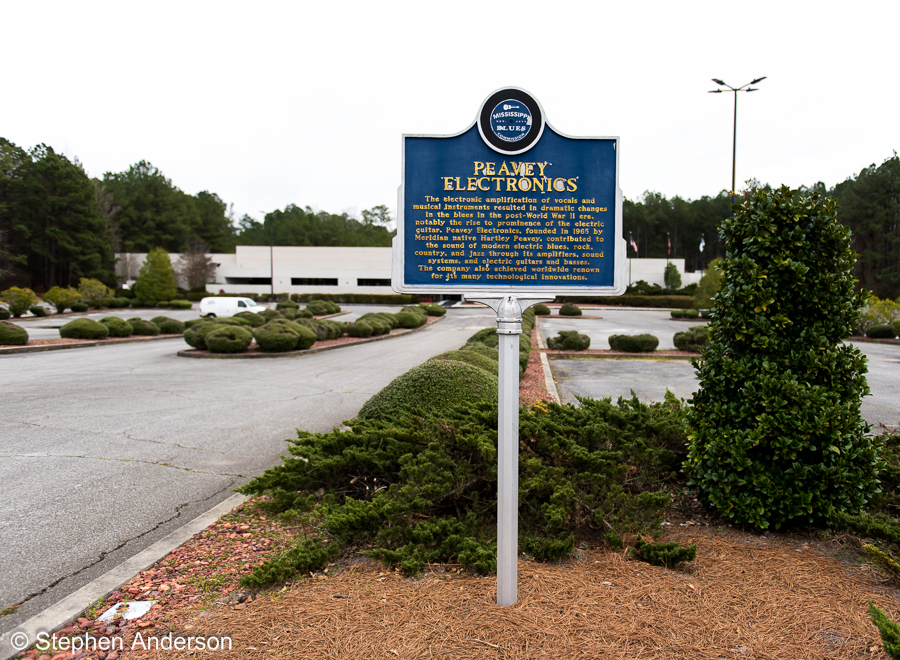 Top photo: The famous Peavey logo; above photo: Mississippi Blues Trails marker for Peavey Electronics in Meridian, MS
Top photo: The famous Peavey logo; above photo: Mississippi Blues Trails marker for Peavey Electronics in Meridian, MS
Most early blues musicians performed at private house parties, on street corners or in one room juke joints and clubs where they relied upon the loudness of their acoustic instruments and the power of their voices. But, that began to change in the 1930s with the advent of the electric guitar and widespread use of electronic microphones, especially, in larger cities like Chicago. The arrival of electronically amplified instruments was one of the most striking changes in the history of the blues, as it allowed musicians to be heard by larger crowds and to change the sound quality of their music.
The first blues recordings featuring these new instruments were made in 1938 when George Barnes, who appeared on a session with Big Bill Broonzy and Casey Bill Weldon, the “Hawaiian Guitar Wizard”, played an amplified steel guitar on two songs. Amplification became the standard after World War II and the widespread availability of electricity to rural areas such as the Mississippi Delta. Instruments were just one part of the electrification equation; their voices also had to be amplified. It was in this field of amplifiers and sound systems that Peavey Electronics made its first contributions.
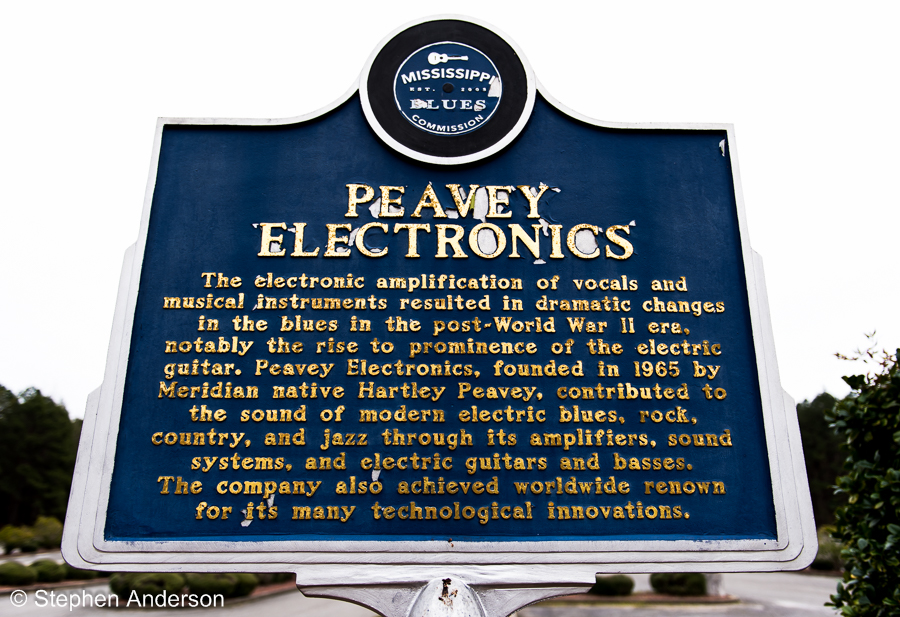 Mississippi Blues Trail marker for Peavey Electronics in Meridian, MS
Mississippi Blues Trail marker for Peavey Electronics in Meridian, MS
Hartley Peavey (b. 1941) attended a 1957 concert in Laurel of Mississippian Bo Diddley, who was also known for building his own guitars and amps and in his words, “I went crazy. I just wanted to play guitar. My Dad, who owned the town music store, wouldn’t give me one and told me, ‘You don’t want to play guitar. Rock ‘n’ roll is crappy music; it will never last.’ So, I built my own out of old guitars pieces and made my own pickup. Then, I wanted amp; it was the same story. So, I built this big old amplifier from surplus parts. It wasn’t very good, but it worked. Just like any other kid, I wanted it now. That’s how I got started.”
In 1961, Peavey began building his own branded amplifiers in the loft of his family’s Meridian music store and was issued his first patent in 1964. He explained, “When I got out of college in 1965, I had been thrown out of three bands. I was just about good enough to be in dormitory bands. I would build the gear for every group I was with and then a strange thing started happening. Once I had built all the gear they needed, they’d kick me out. So, when I got thrown out of the third group that was the turning point. I had to look in the mirror and be totally honest with myself. I said, ‘Looks like you’re not going to be a rock star so what are you going to do with your life?’ The answer was clear. I love music and I love musicians, so I’ll just build good gear at a fair price for them. I’ve been doing it ever since.”
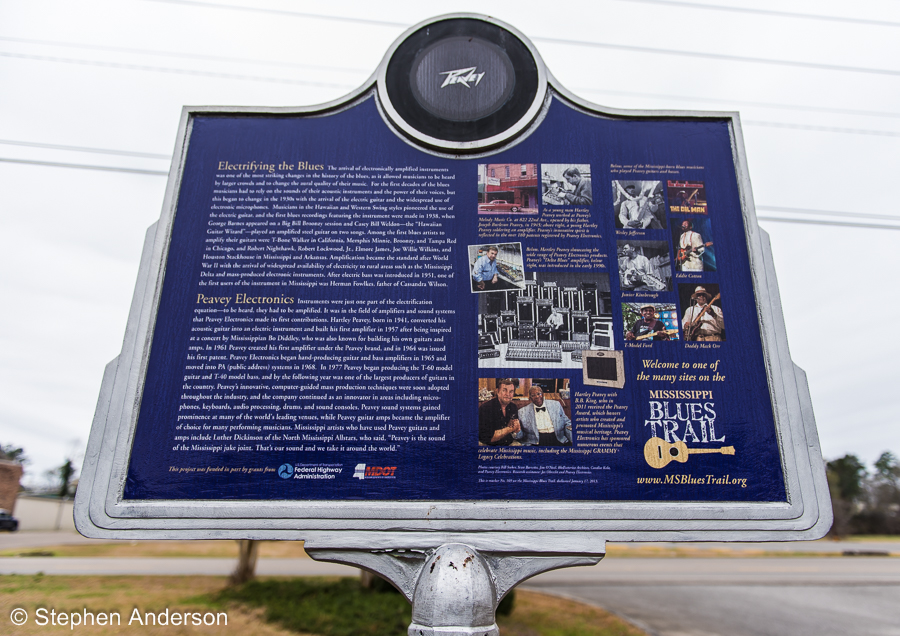 Mississippi Blues Trail marker (opposite side) for Peavey Electronics in Meridian, MS
Mississippi Blues Trail marker (opposite side) for Peavey Electronics in Meridian, MS
In 1993, working with Peak Audio, Peavey introduced the world’s first digital audio networking system, MediaMatrix. He recalled, “People didn’t understand you could configure the system at a touch of a button. I had a lot of very high profile skeptics. The way we got it accepted was we put a little MediaMatrix system in our company plane and flew it all over the country to designers’ offices to demonstrate its capabilities, showing how a high value facility can instantaneously change its system and provide the operator with as much or as little control as they want. We had to convince people that computers were reliable enough to control their sound systems at a fair and reasonable price. A lot of people assume that you can judge performance, quality, and reliability on price alone. That’s an unwarranted assumption.”
Peavey’s innovative, computer-guided mass production techniques were soon adopted throughout the industry, and the company continued as an innovator in many areas including microphones, keyboards, audio processing, drums, and sound consoles. Peavey sound systems gained prominence at many of the world’s leading venues, while Peavey guitar amps became the amplifier of choice for numerous performing musicians.
Peavey Electronics Corporation opened its doors in 1965, hand-producing guitar and bass amplifiers then moved into PA (public address) systems in 1968. The audio empire would grow to export 2,700 products to 136 countries and earn 180 technology and manufacturing patents.
“I hope that this thing I’ve created is something that has made a lot of difference in a lot of peoples’ lives. That’s the best we can hope to do. If you do what you do just for the money it won’t work. I’m passionate about what I do. That hasn’t changed since 1964. You’ve got to dare to be different; if you don’t you can never be the best. There are some things that I would change, but not many. Would I have given it all up to become a rock star? Absolutely.”
– Hartley Peavey
The Southland Music Line invites you to come with us as we continue to explore more fascinating stops and stories along the Mississippi Blues Trail.
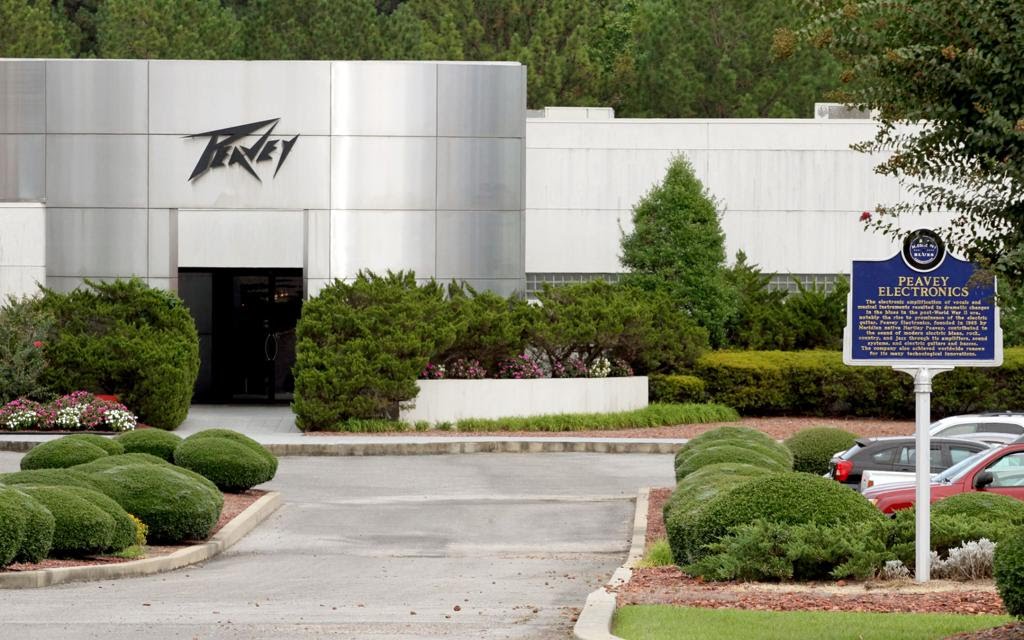 Peavey Electronics in Meridian, MS (Photo from the Meridian Star)
Peavey Electronics in Meridian, MS (Photo from the Meridian Star)
Click Here for Other Articles in our Mississippi Blues Trail Series.
Credits:
Mississippi Blues Commission
avinteractive.com, by Clive Couldwell – Nov. 25, 2015
inc.com/magazine, by Kasey Wehrum – Oct., 2011
premierguitar.com, by Joe Coffey – Dec. 15, 2008
Page Designed & Edited by Johnny Cole
© The Southland Music Line. 2022. All rights reserved

COPYRIGHT NOTICE: We welcome requests for permission to use content from The Southland Music Line website and Facebook page. Any shared articles or photos may not be altered, edited nor cropped and must include the appropriate copyrights of The Southland Music Line.


